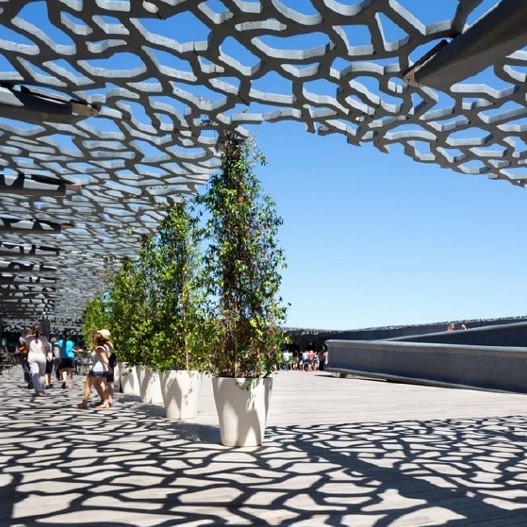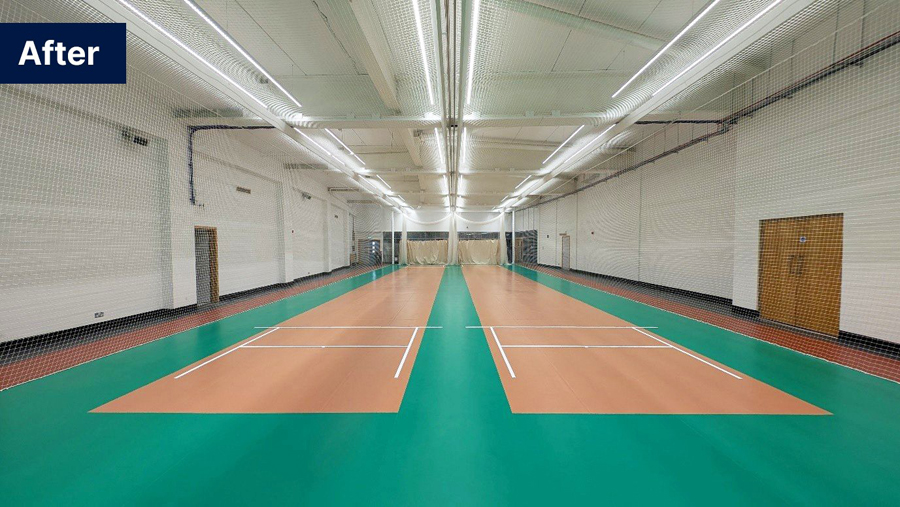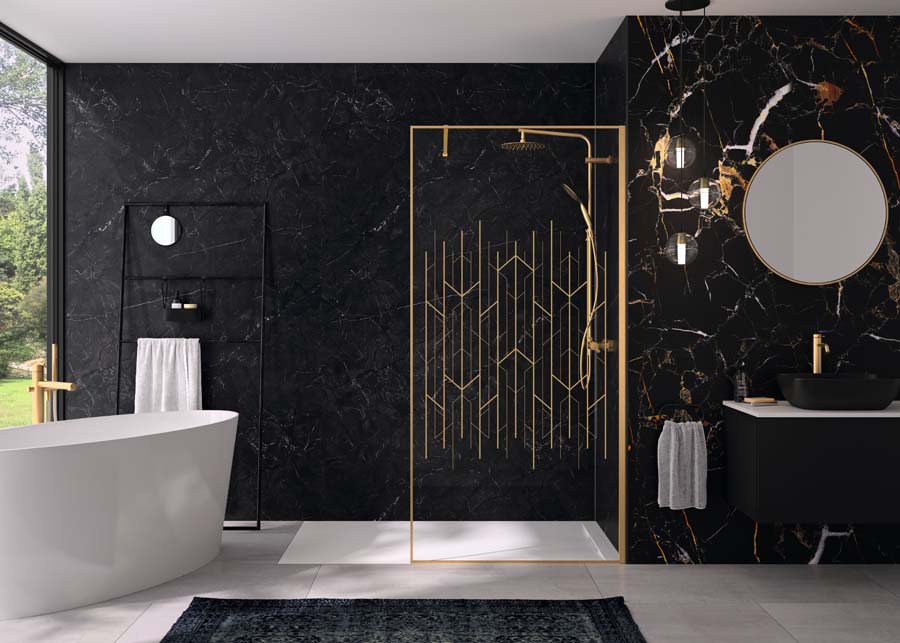
The Museum of European and Mediterranean Civilisations designed by the Algerian-born French architect Rudy Ricciotti is the flagship project of Marseille's on-going architectural and cultural renaissance.
The museum is located on Marseille’s seafront next to a seventeenth century stronghold, Fort St Jean. Built upon the Greek and Roman vestiges of the antique city-state, the Fort is charged with history and includes a chapel which dates back the twelfth century.
Rudy Riciotti’s classic monolithic design is built around a perfect square; each side of the building is 72 metres. An inner square of 52 metres per side forms the heart of the museum and comprises the exhibition and conference halls.
The inner structure, which is composed of steel and glass, has been covered with a delicate ornamental skin of filigreed concrete. The same innovative material has been used to create 308 tree-shaped pillars that stand at over 8 metres high and form the vertical structure of the building. This patterned concrete skin opens the building to natural light and views of the sea allowing the marine atmosphere to pervade entirely the inside of the building.
Furthermore, the lace veil of concrete on the outside of the building creates intricate shadow patterns that can be seen as “a projection of the bumpy and irregular sea bed” comments Ricciotti.
He goes on to say his Museum is, "open to the sea, to draw a horizon where the two shores of the Mediterranean can meet".
The Museum is organised on three levels with an array of exhibitions, an auditorium and a bookstore. The rooftop is a particular feature and is set to become an iconic venue for the city with beautiful panoramic views of the sea and harbour. At night a lighting scheme designed by Yann Kersalé creates a magical atmosphere with shades of blue and turquoise.
A wonderful setting to showcase heat-treated ash The top floor roof decking, which spans a width of 24 metres covering an area of 1600m², is made
from heat-treated American ash, supplied by Bingaman and Son Lumber Company in Pennsylvania, USA. The top deck sits along the pedestrian route running through the Museum and across Marseille’s historic seafront, so with a constant flow of pedestrians a heavy duty decking solution was essential.
“We asked the general contractor to come up with a decking solution that could withstand an average load of 250 kg/m²,” explains Tilman Reichert, the project architect.
Eric Durand from Roofmart, the contractor in charge of supplying the heat-treated ash decking comments: “The architect was looking for solutions that would avoid him specifying tropical hardwoods; initially he wanted to try heat-treated pine but was not happy with the results of the initial trials.
"The quality of the heat-treated ash we were delivered was first class. When the architect saw the samples he was won over both by the aesthetic appeal of ash with its characteristic grain but also its dimensional stability and long lengths (20 x140).”
The thermal modification process uses a high temperature in a controlled environment permanently altering the wood’s chemical and physical properties. This limits the ability of the wood to absorb moisture, so products are more dimensionally stable and less prone to cup, warp and twist with changes in humidity.
The thermal modification process also removes the nutrients in wood that would otherwise provide a food source for insects and wood-destroying fungi. This increase in dimensional stability and decay resistance significantly extends the service life and reduces maintenance needs of the decking. Given its marine environment, the deck is highly exposed to weathering from the sun, rain and sea spray so will be monitored to assess its performance over time.
Tilman Reichert the project architect comments: “We believe that ash with its long wood fibre will offer greater resistance to wear than pinewood.”
The decking is laid on a traditional system of boarding joists to allow the insulation membrane directly under the wooden decking to be well ventilated. The boards were nailed not screwed which is visually more pleasing.
AHEC European Director David Venables says: “The Museum of European and Mediterranean Civilisations is a superb example of the use of newer technologies of hardwood durability enhancement. There’s a developing market for thermally modified hardwoods in Europe and this project publically showcases their potential.
"By processing wood produced from America’s well-managed hardwood forests, thermally modified hardwood provides a quality, environmentally friendly and sustainable alternative to imported tropical hardwood species.”
The weight of the 24 metre wide rooftop terrace contributes to stabilising the concrete pergola above it through a clever system of stainless steel cables. The vast veil surrounding the terrace is made up with the same intricate filigreed concrete that covers the sides of the building. It rests on
15 metre wide concrete cantilever beams that sit on top of the main vertical pillars of the building.
On the outside of the building the cantilever beams carry the weight of the external ramps that lead up to the terrace through long stainless steel braces that span the whole height of the building.
Stainless steel cables have also been fixed from the wooden deck to the cantilever beams which overhang above the terrace by 4 metres to stabilise the whole canopy structure above the terrace.




















